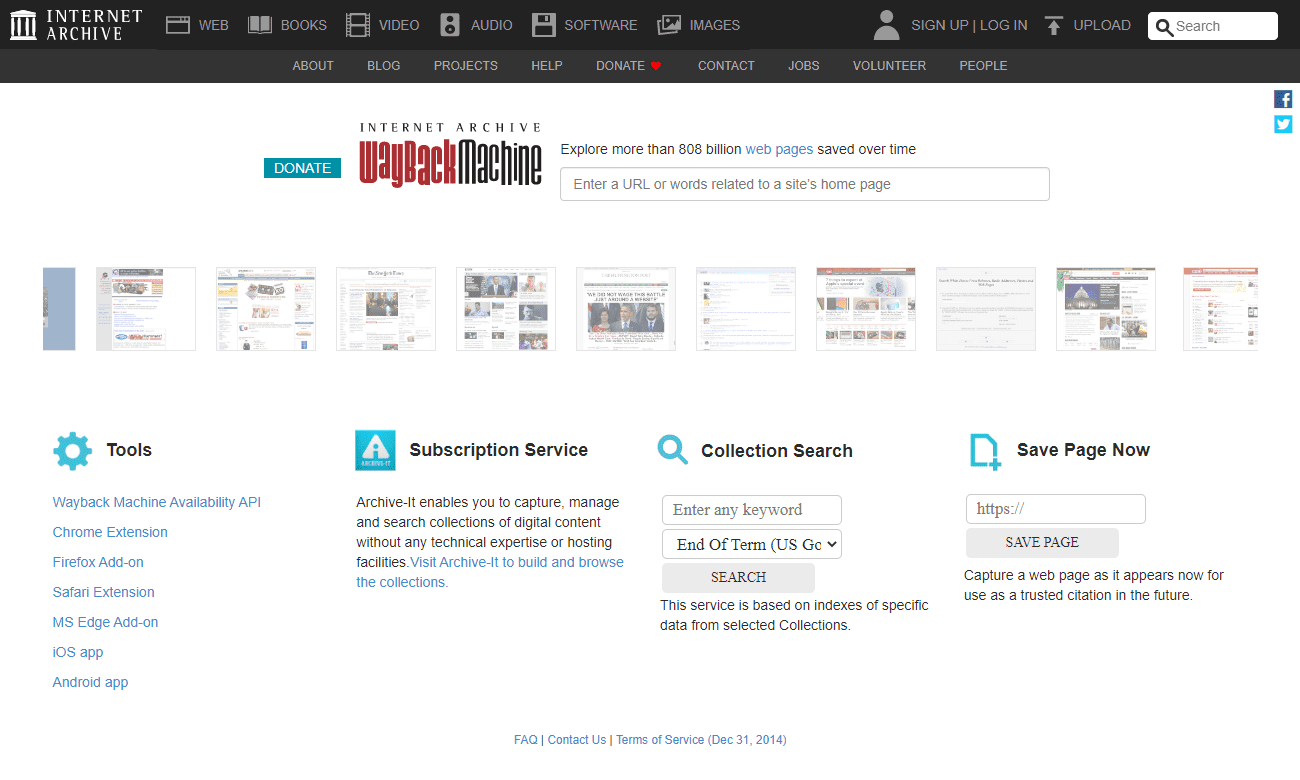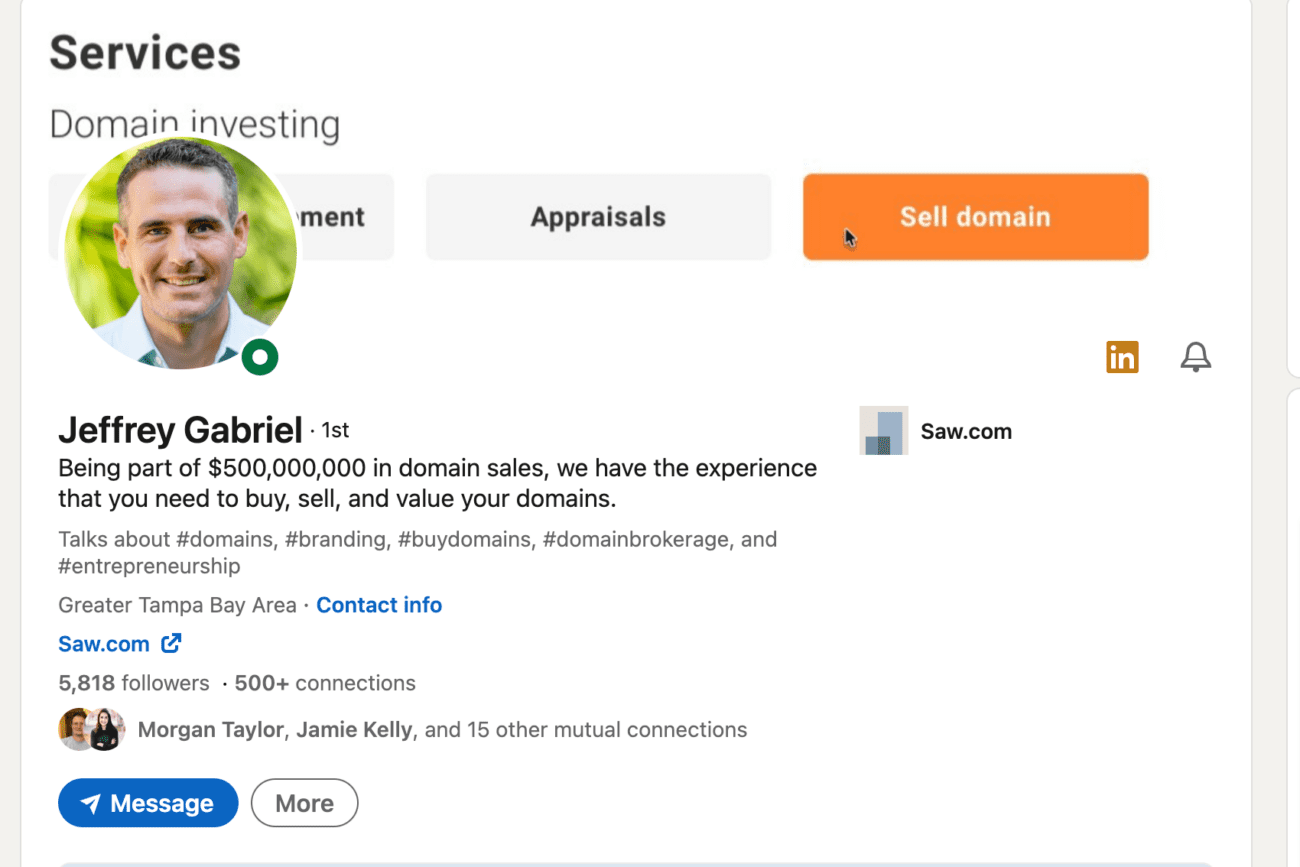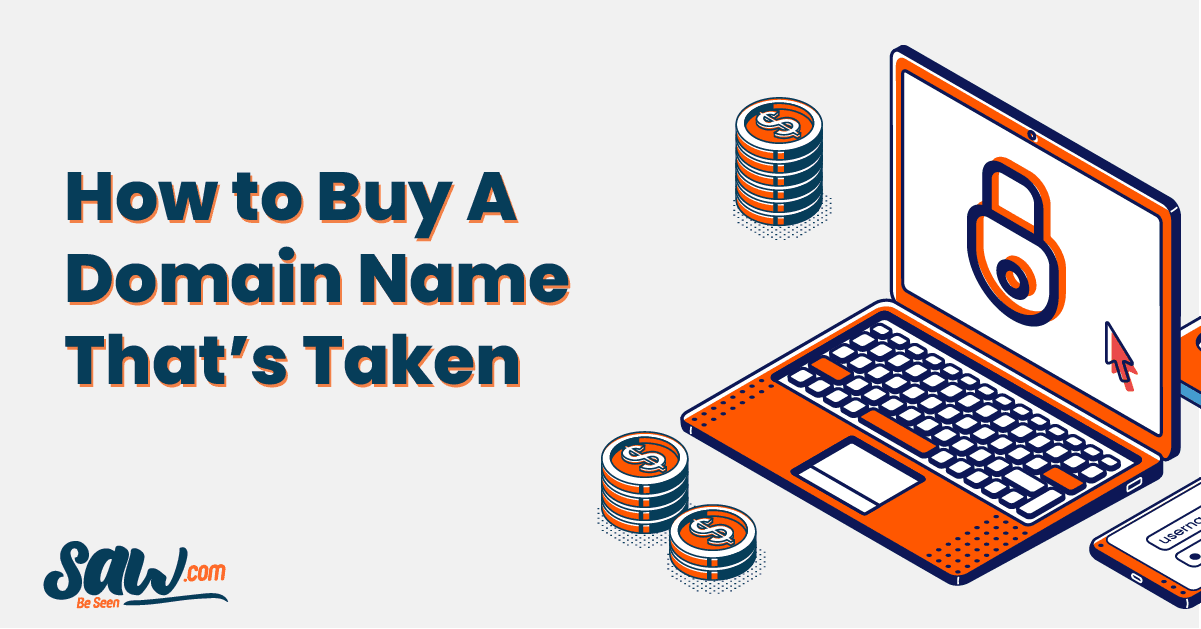You have started on a new venture, building a business or rebranding. Now it is time to buy a domain that will help you reach your business goals.
There is only one problem. The perfect domain you want is taken and registered by someone else. What do you do?
You have a few options. Either choose an alternative domain for your business or figure out a way to purchase the domain that is taken. If you are determined to acquire this domain, you have come to the right place.
Today we will discuss step by step how to acquire an already registered domain. Additionally, why it is important to acquire the first choice .com domain. Here is the Saw.com guide to purchasing a domain name that is already taken.
Purchasing a Domain From Someone
Working with a domain broker can simplify the process since they handle the bulk of the heavy lifting for you.
Domain brokers are industry experts who can help you find the perfect domain and negotiate a fair price with the current owner.
They leverage years of experience to provide valuable market insights and can set your expectations for negotiations.
Reputable domain brokers can also assist with transferring ownership and ensure that all legal requirements are met, saving you both time and money in the long run.
Here is our step by step process:
1. See How the Domain is Being Used
The first step is to visit the domain. How is it being used? Is it a real website? Has it been updated in the past couple of years?

Start by visiting Archive.org to look at previous screenshots of what was on the site so you can see what it was use for. You can use various online tools to appraise the value and negotiate with the owner of the domain for a fair price.
If it is just a placeholder that is not being used as a website, you will most likely be able to acquire the domain. The owner will likely be willing to sell, and possibly at a lower price.
2. Find the Domain Owner
This can sometimes be a difficult part of the process. The first step is to conduct a “WHOIS” search. This will provide some information about the domain, such as:
- When the domain was registered
- Who registered the domain
- When the domain expires
However, a WHOIS search does not always work. Some domain owners purchase privacy protection, which means their names and information will not come up when searched. In this case, you have to do more work to find the domain owner.
When buying an established domain name from someone else, it’s vital to research the seller and their portfolio. A reputable seller should have a track record of successful sales and positive feedback from previous buyers. Because there are so many scammers on the internet, it’s a good idea to make sure you’re dealing with a legitimate owner with the legal right to sell the domain.
Use LinkedIn, Facebook, and other social media channels to validate the seller’s identity.

Consider using an escrow service for more security and peace of mind during the transaction process. Take your time. Do your due diligence to ensure a successful purchase and transfer of ownership without any issues down the line.
3. Come Up with a Budget
Before contacting the owner, you must determine a budget. Specifically, the highest offer you are willing to make. If you are unsure about your budget, use a domain appraisal service. Additionally, understand the factors that go into the price of a domain:
- Length: 3-4 letter domains are usually the most expensive.
- Memorability: Easy to spell and memorable domains are usually more expensive.
- Brandability: Easily brandable to a business.
- Age: Generally, the longer a domain has been registered, the more it will cost.
- Industry: Domains with popular industry keywords are more valuable because they tend to rank higher on search engines.
Once you have educated yourself on domain appraisal and have set a budget, you are ready to negotiate.
4. Contact the Owner
If your WHOIS search was successful, you have two options when contacting the domain owner. Either reaching out directly via email, or using a domain brokerage service to reach out to the owner on your behalf.
If you reach out directly, send a polite email offering to purchase the domain name. Keep it brief with an introduction to who you are and maybe an initial offer. If you use a domain brokerage service like Saw.com, a broker will reach out to the owner and handle all communication and negotiation for you.
5. Negotiate
When negotiating with a domain seller, it’s crucial to do your research and have a clear budget in mind. It’s not necessarily about the money you spend on the domain itself, but the value that web address brings to your business.
A formal domain appraisal can give you an idea of value, which helps you with budgeting and what you’re willing to offer.
When you find a domain you want to make an offer on, remember: premium domain names (keywords, easy-to-remember, etc.) can easily sell for tens or hundreds of thousands. But it’s possible to purchase many domains for under $3,000.
Regardless of what you’re looking to buy, have a budget in mind before you begin negotiations. This saves everyone’s time.
Actionable Steps for Negotiation
Follow these steps to help you achieve the desired outcome:
- Research the domain name’s history and previous sales to give you an idea of what to expect as you negotiate.
- Determine a budget and make an initial offer that is lower than your maximum budget to give you room for negotiation. The seller may be fielding multiple offers, so you want to grab attention but avoid going straight to top dollar.
- Be respectful and polite in all communications with the seller. If you’re rude, you’ll get skipped over in favor of another buyer.
- Consider offering additional incentives, such as a quick close or a testimonial can sweeten the deal in your favor.
Remember that successful negotiation often involves finding a win-win solution for both parties involved. You’re also free to make multiple offers on different domains, so you’ve got options.
6. Confirm the Sale and Transfer Ownership
Get the terms of purchase, how the domain will be transferred, escrow and any other laws that apply to the sale in writing.
This can be complicated to do alone. We suggest hiring an attorney to make the process smoother, and ensure you are protected.
The seller should initiate the transfer process, which requires them to unlock the domain and provide an authorization code. Names registered within the last 60 days cannot be transferred per ICAAN rules, so be sure you know which registrar you want to use ahead of time.
Some registrars may require additional steps to transfer ownership, such as confirming your contact information or verifying your identity. The easiest way to ensure you get a smooth domain transfer is to familiarize yourself with your registrar’s requirements. If the domain is already with the registrar you want to use (it’s already with GoDaddy, and you plan on using GoDaddy, too), the process isn’t as tedious.
Unfortunately, the internet is full of people looking to take advantage of unsuspecting business owners. To protect yourself:
- Examine historical records to see what kind of website used to be associated with the name.
- Verify the authenticity of any documents or agreements the seller provides before making payment.
- Use an escrow service to provide an extra layer of security during the transaction and ensure a smooth transfer process.
- Once the sale is confirmed, update the domain’s contact information and transfer ownership as soon as possible.
Frequently Asked Questions
Should I Purchase A Different TLD Domain?
No. Sometimes, when businesses can not acquire their first choice .com domain, they choose a different top-level domain (TLD). Why? It is the same domain root, with a cheaper TLD than a .com. The strategy seems to make sense! But, it can hurt you in the future.
When customers conduct a Google search to find a business, the default is .com. Going with a different TLD, like .net, .biz, .org etc. can make it harder for these customers to find you. Especially if there is the same exact domain registered with a .com already.
Additionally, this could cause legal trouble with the domain owner of the .com. We suggest investing up front in your first choice domain to get the .com you want. If that does not fit your budget, choose a new domain name.
Can you buy domains from people?
Yes, you can buy them from the current owners. It is up to the owner to set the price and market the domain for sale.
How much does it usually cost to buy a domain name from someone else?
The value of a domain name can vary based on many factors. The most important factors determining the value of a domain name are: The domain extension, the length of the domain name, the industry it falls into, and supporting comparable sales.
How do I permanently buy a domain?
You cannot permanently purchase one. You can register it for up to 10 years at a time, with one year being the minimum. The cost is based on the registration length.
How do you get a domain name that is taken but not used?
You must contact the owner and negotiate the sale. Brokers can help you reach the correct person or company.
Ready to Acquire Your Dream Domain?
Interested in acquiring a premium domain name for your business? Do you want guidance while building your business? Contact our domain brokerage for a free consultation!
Our team at Saw.com specialize in the acquisition of digital assets, and have over twenty years of experience in the industry. Our domain brokers are experts in domain acquisition, appraisal, branding, brand protection, portfolio management services and more. We pride ourselves in our transparency and passion to help you reach your goals.
At Saw.com, our mission is to help you be seen online. If you are interested in speaking with an expert from our domain brokerage service about buying a domain, contact us! Our domain brokers would love to speak with you! Get expert advice today!

